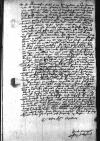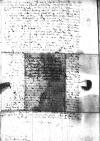Si Tua Reverendissima Excellentia ex animi sententia valet cum generosa matre, fratribus et sororibus ac tota aula, est quod ex animo gaudeam. Polyphemus tuus Tibi dedi{c}tissimus perbelle valet, gratia superis.
Intellexi a domino ⌊Nicolao Plotoski⌋ vestes meas esse salvas et non periisse incendio. Ex animo doleo iacturam illorum bonorum civium. Quirinus reliquit aulam Vestrae Reverendissimae Excellentiae omnibus insalutatis et ignoramus, quorsum se diverterit. Fuit in ⌊Marienwerden⌋, apud reverendissimum episcopum, doctorem ⌊Speratum⌋, ad unum atque alterum diem, verum, relicto episcopo, recta petiit ⌊Gedanum⌋. Testor Christum Optimum Maximum, si Quirinus non detulisset me apud generosam ⌊matrem⌋, res illa fuisset sopita. Ex animo doleo et non possum ponere finem doloris, quod ⌊mater⌋, fratres et sorores ob vocalem unam, quam dixi Quirino in aurem, et non dixi affirmative, sed conditionaliter, ita loquendo: “Quirine, si ita ageretur in nostra regione aut Germania Superiori, diceretur, quod esse libenter vellet habere rem cum virgine vel habuisse”. Mihi testis est Christus, hunc in modum dixisse, nihil detractum est virginitati aut honori virginis probissimae, sed alterius potius lasciv{i}ae. Mihi et multis aliis dixit Quirinus: “Mi Polypheme, Lambertus venit ad me: Quirine, audivi certa verba hesterno vesperi, quae Polyhemus tibi dixit, oro accedas una mecum matrem reverendissimi et ei significabimus, quod talia praesumit de me”. Si Quirinus sapuisset et respondisset Lamberto: “Lamberte, Polyphemus fuit probe potus et ignoro verba, quae dixit”, iam res esset infecta et non venissem in indignationem matris, fratrum et sororum.
Ex animo doleo, Reverendissime Praesul, quod debeam dimittere Tuam Reverendissimam Excellentiam, verum melius est cum gratia et concordia, etiam et venia Vestrae Excellentiae mutare sedem et locum, quam cum odio et invidia ac indignatione ⌊matris⌋, fratrum et sororum manere. Suppliciter supplico Vestrae Reverendissimae Excellentiae, Vestra Reverendissima Dominatio velit Polyphemo dare vestem aliquam in perpetuam memoriam Vestrae Dominationis et viaticum honestum, quo possit honeste venire ad patronem suum, dominum ⌊Erasmum Roterodamum⌋.
Vestra Reverendissima Excellentia scripsit mihi ex ⌊Marienburgo⌋: “Mi Polypheme, non penitebit te facti, quod fratrem meum ⌊Bernardum⌋ tanto studio tantaque diligentia custodieris”. Quae praestiti ⌊fratri⌋, ex animo feci, plura praestaturus nunc Reverendissimae Vestrae Excellentiae, sed ex animo doleo, quod ⌊mater⌋, fratres et sorores non considerant meos labores et meas molestias, quas habui in infirmitate domini Bernardi, cum mater ipsa saepissime mihi dixit lacrimantibus oculis: “Mi Polypheme, numquam ero immemor beneficiorum et te posthac amabo tamquam filium”.
Reverendissime Praesul, dominus ⌊Plotoski⌋ et Polyphemus tuus perlustravimus aliquot arces … et civitates et fuimus apud multos magnates, qui nos humanissime tractarunt nomine Vestrae Excellentiae.
Si commodum fuerit Vestrae Reverendissimae Dominationi, salutabit me<o> nomine generosissimam matrem, fratres et sorores, doctorem ⌊Campensem⌋ ex animo et me, flexis poplitibus et complosis manibus, orare veniam de verbis dictis.
Bene valeat Vestra Reverendissima Excellentia. Quam nobis diutissime servet florentem et incolumem Christus Optimus Maximus.


 AAWO, AB, D. 67, f. 79v
AAWO, AB, D. 67, f. 79v